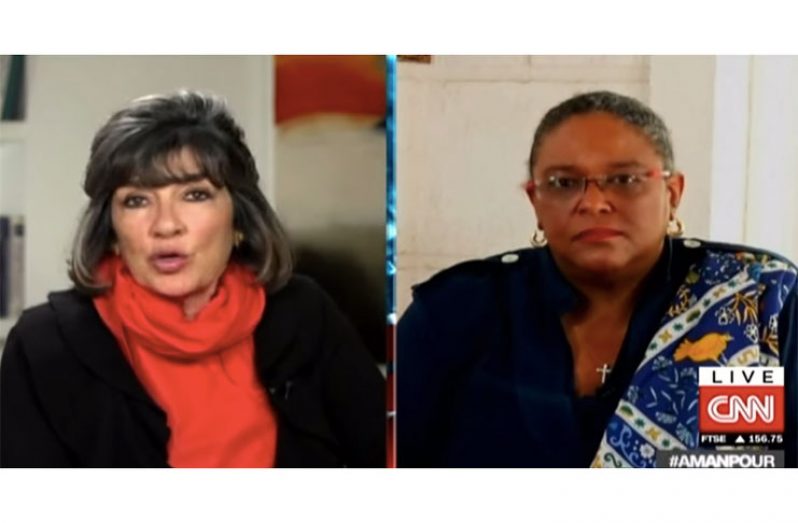— PM Mottley hits home importance of global leadership
CARICOM Chair and Prime Minister of Barbados, Mia Mottley, has been thoroughly praised for her representation of the Region on CNN, on Wednesday, when she pointed out that the Caribbean is uniquely challenged by COVID-19 and it is only through collective world effort can positive change occur.
“I can pretty much speak on behalf of all of us that this has been the most destabilizing event for our countries probably since World War II,” she told well-known CNN journalist, Christiane Amanpour.
She noted that while the Caribbean Region is not unique with regards to being impacted by the pandemic; along with the crisis, the Region must grapple with a number of pre-existing risk factors. Mottley first listed the fact that the Caribbean is a highly indebted region because it is the most travel-dependent and trade-dependent region in the world.
A STRING OF CHALLENGES
According to the United Nations Economic Commission for Latin America and the Caribbean (ECLAC), the average gross public debt of Caribbean countries was 71.8 per cent at the end of 2018, a year-on-year drop of 2.6 percentage points.
At the national level, Barbados still had the highest public debt, the equivalent of some 4.7 per cent of its GDP as of March 2019, followed by Jamaica, which had a public debt of 93.8 per cent of GDP, even though the latter has reduced its debt by almost nine percentage points of GDP since the close of 2018.
Mottley said that the Caribbean Region will have to pay USD$8.8 billion in debt between 2020 and 2021. This debt was racked up over time as almost half of the Caribbean’s GDP and jobs comes indirectly and directly from tourism. Added to this, the CARICOM chair said that the region is on the cusp of a climate crisis being now only four weeks away from the hurricane season.
Hurricanes in the Region are the most frequent of natural disasters and will likely to bring its fair share of challenges. It is predicted that this year will witness above-average events with 16 named storms of which 7 will be hurricanes and 3 to 4 being major ones. Prime Minister of Antigua and Barbuda, Gaston Browne, had told the World Bank and International Monetary Fund (IMF) earlier in the month that, with the region’s already precarious state, the effects of a hurricane would be beyond catastrophic.
Just last year, Hurricane Dorian ravaged The Bahamas, claiming the lives of 65 persons and being deemed the strongest hurricane on record to affect the island. Mottley stated: “What is little spoken about is that the climate crisis has also resulted in droughts and sargassum seaweed which has meant a number of our hotel establishments and restaurants were already suffering before this pandemic.”
Though Guyana is not known for its beaches, just this month its Kingston shoreline was laden with foul smelling sargassum that has washed up and subsequently rotted away.
GLOBAL LEADERSHIP NEEDED
The CARICOM Chair said that it is now more than ever that global leadership is needed.
“If there’s one thing I’d like to see coming out of this is a global leadership initiative. 75 years ago the United Nations was formed on October 24; we used the opportunity of post World War II to create a number of vital institutions to be able to bring countries together, to protect the most vulnerable and the weakest among us. We also used it to create the Bretton Woods Institutions which we’re relying on but we need to repurpose these organisations and, in having a global leadership initiative, make sure that we are really reacting to what is real,” she said.
Mottely said that such repurposing is necessary as the Caribbean countries are told that they can access grant funding if they have historic per capita incomes that are below certain levels which is currently futile to the Region. She said that such a one-size-fits-all criteria does not benefit the Region and this argument has been put forward for over 30 years.
She stated that a plan that protects not just the strongest among us but also the most vulnerable must be crafted. For her own country and hopefully for others, the Barbadian PM has called for the establishment of a Vulnerability Index to assess how exposed a country is to future economic public health risks and natural disaster clauses in sovereign debt contracts.
As the first female Prime Minister of Barbados, she said that there is no special difference about female save for the fact that they care. “Simply that we care. We care and we have to care because in the same way that we want people to take care of the most vulnerable in the household, we want it in the country and I’m asking you to help us do it internationally. That’s why we need a global leadership initative,” she said.





.jpg)








